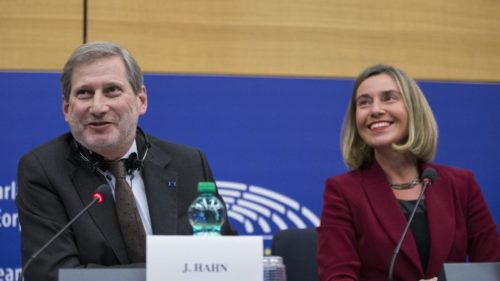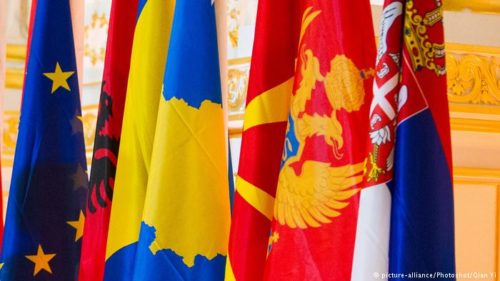Go Southeast, Young Man
EU Strategy for the Western Balkans

Commissioner Johannes Hahn and High Representative Federica Mogherini (Euractiv)
Post-holiday February is presumably the time of the year when most people would like to press fast-forward until summer, or at least to skip a month or two. This summer, my plan is to visit Thessaloniki, the Greek pearl on the Aegean Sea, about which I have heard only good things. However, as I am still not a travel blog writer, my focus today is on the political synonym that comes with the name of this fascinating city.
In June this year, it will be 15 years since the EU–Western Balkans Thessaloniki Summit, which marked an opening of the EU enlargement perspective for the Western Balkans, and basically coined the term. The expression was defined by the formula of ex-Yugoslavia, minus Slovenia, but plus Albania. Thessaloniki opened up the opportunity for every Western Balkan state to gain EU membership if they fulfil the criteria. Since then, a lot of things have naturally changed and I would need a book chapter to address them all.
In recent months, the Western Balkans mostly appeared in the main European news outlets for excessively shocking reasons, starting from the happenings in the ICTY Tribunal to the assassination of Serbian politician Oliver Ivanovic in Kosovska Mitrovica. However, this week they were trending on Twitter and other social media platforms for a very nice occasion, which was the new European Commission strategy for the Western Balkans. It consists of six flagship initiatives, focusing on: rule of law, security & migration, socio-economic issues, transport & energy, the digital agenda, and reconciliation through good relations.
Commission President Jean-Claude Juncker took the floor at this week’s European Parliament Plenary and pointed out a couple of relevant issues. The first one was to clarify that the date of 2025 for Serbia and Montenegro is an indicative one, as accession will depend on the progress of these countries. It was a diplomatically aimed statement, as the 2025 date was quietly criticised by some sceptical EU Member States, and loudly criticised by other Balkan states that felt left out. Kosovo President Hashim Thaçi even went so far as to accuse the EU of catering to populists and islamophobia, as it would favour majorly Christian Orthodox countries over countries with a higher percentage of Muslims.[1]
Commission President Jean-Claude Juncker added that no Western Balkan country will be allowed to enter the EU without solving their border issues, alluding to the current dispute between EU members Slovenia and Croatia. Finally, Mr. Juncker is also set to go on a Western Balkans tour at the end of this month to reassure countries of his support. He will end his stay in Bulgaria, the currently presiding EU Member State, whose Prime Minister Boyko Borisov is strongly supporting EU enlargement. Everyone agrees that the Western Balkans have to take advantage of the current and upcoming presidencies (Bulgaria, Austria, Romania, Finland, Croatia and Germany), which would put enlargement strongly on the agenda.
The aforementioned Boyko Borisov recently praised Macedonia for its mature approach in signing a treaty of friendship with Bulgaria, relaxing the relations between the two countries. The Macedonia name negotiations are currently underway, and the new government in Macedonia is showing willingness to finally reach a deal with Greece, aware that they have lost more than 10 years of potential EU negotiations due to nationalistic defiance of the former regime. NATO is also waiting for them to join after resolving the name issue. Although it seems that Serbia, Montenegro and Macedonia have reasons for optimism, in Bosnia and Herzegovina, Albania and Kosovo the situation is viewed differently. It is something which should not be disregarded.

EU and Western Balkan Flags (Deutsche Welle)
Bosnia and Herzegovina is extremely late with the EU questionnaire, and is in danger of losing another year due to general elections being held this autumn. The possible outcome of the elections could also prove problematic for the country that urgently needs reforms. Kosovars were quite disappointed with this strategy as they are in the worst position, hardly mentioned, mostly in the context that they need to normalise relations with Serbia and to find a solution for their issue. It goes without saying, but the lack of visa liberalisation is also a huge disappointment for Kosovo citizens. Apparently the Spanish government, in light of Catalonian problems, lobbied heavily against them, by sending a recent non-paper to the EU Commission highlighting their status. Finally, Kosovo is disappointed with the allegedly strict conditionality imposed on them.
Albania would agree that conditionality is too strict for them as well, and they always point out how their foreign and security policy is completely aligned with the EU (along with Montenegro). Federica Mogherini is very happy with that, but then we come to the issue of Russian sanctions and foreign influences in the region. Countries such as Russia, China, Saudi Arabia and Turkey have both political and economic interest in remaining present in the region, and the EU is aware that it can remain the strongest factor in the region only by giving a European perspective to the states.
High Commissioner Mogherini stated several times yesterday “Let’s make it happen”, but it takes two to tango. The EU has now, after years of passivity, finally produced a relatively realistic/optimistic document, driven by factors such as plain economic interest, Brexit, foreign interference, migration/security, etc. The upcoming summit in Sofia, planned for May, should be the highlight of the pro-enlargement Bulgarian presidency, and will be interesting to follow. However, what many do not seem to realise is the fact that there is still a deep scepticism about EU enlargement among EU citizens. Some of them feel it is now time to stop enlargement and focus on deepening the EU in the post-Brexit era. Hence, it is a job for the Western Balkans to prove them wrong, and then for the EU to deliver this message to its citizens.
[1] https://www.euractiv.com/section/enlargement/opinion/eu-enlargement-tear-down-mental-walls-in-the-balkans/
